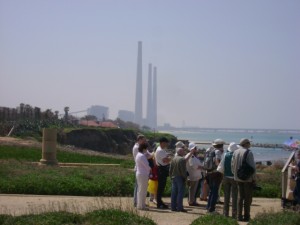Israel’s new oil could provoke next war
 Does Israel have oil? The very phrase Israel’s oil could change the game in the Middle East—and provoke all-out war.
Does Israel have oil? The very phrase Israel’s oil could change the game in the Middle East—and provoke all-out war.Could Israel really have oil?
The Zion Oil and Gas Company has been looking for oil along the Mediterranean coast, and just south of the Sea of Galilee, for several years. Two days ago they announced that they had drilled a test well in their Joseph License lands (between Haifa and Tel Aviv) to 5900 meters. They earlier found large hydrocarbon deposits at the site, usually a good sign.In August of 2010, the Givot Olam company announced a find of 1.5 billion barrels near Rosh Ha’Ayin (literally “head of the spring”). But the Israeli newspaper Ha’Aretz (“The Land”) pointed out that the reserve would be far too small, and Givot Olam could never hope to pump the oil out fast enough to make a dent in Israel’s oil imports.
But Israel has discovered two huge fields of natural gas:
- The Tamar field, off the Mediterranean coast south of Jaffa, and
- The Leviathan field, offshore near the 1949 armistice line between Israel and Lebanon.
Biblical support for Israel oil
John Brown of Zion Oil and Gas, and Tovia Luskin of Givot Olam, both cite the Bible for clues. Specifically, they cite Deuteronomy, Moses’ farewell to the Israelites before he died.Blessed of the LORD be [Joseph’s] land, with the choice things of heaven, with the dew, and from the deep lying beneath… [ch. 33:13]
[T]hey will draw out the abundance of the seas, and the hidden treasures of the sand. [ch. 33:19]
May [Asher] dip his foot in oil. [ch. 33:24]
Those verses have come true, though not exactly as Brown and Luskin guessed. Shale oil is surely a “hidden treasure in the sand.” The offshore natural gas wells are “abundances of the seas.”
If Israel’s oil existed as shale, that would be enough. But the original Hebrew verb in verse 19 speaks of sucking, not merely drawing. Israelis often speculate that the Saudi oil reserves lie in a pool that extends under Israeli territory. They dream of drilling a well into that pool and “sucking out” Saudi Arabia’s vaunted reserves.
How long have Israelis looked for oil?

The Orot Rabin power station, south of Caesaria Maritima. Israel’s oil might make this obsolete. Photo: CNAV
Israeli Jews tell a standing joke: Moses took a wrong turn, because he led his people to the one place in the Middle East with no oil. In 1967, Israel captured the Sinai Peninsula from Gamal Abdel Nasser. For ten years Israel did have oil. But in 1977, Israel gave the Sinai back to Egypt, in return for a right of first refusal on oil from the Sinai. That agreement, part of the peace treaty with Egypt, will not last, if the “Freedom and Justice Party” (a Muslim Brotherhood movement) has its way.
Almost since the Camp David Accords, Israelis have longed for a reliable energy source of their own, or at least any energy source other than oil. (The Israel Electric Company has one power plant along the Coastal Road between Caesaria Maritima and Tel Aviv that can burn coal, and has no commercial nuclear program.)
Hosni Mubarak signed another agreement in 2008 to supply Israel with natural gas. When American and Israeli gas explorers found the Tamar and Leviathan fields, business experts said that the Egyptians would undersell them anyway, so that they wouldn’t make any money from them. That was before the “Arab Spring.” Terrorists have sabotaged the Egyptian gas pipeline twice. The gas is back on, but it will not stay on. And the government knows it.
But if Israel has oil, none of that need matter anymore.
Where is Israel’s oil?
The best part of this news is: Israel’s oil lies west of the 1949 Armistice Line.The Shfela Basin lies well to the west of the Jerusalem-Bethlehem road and hence outside the “West Bank” region. Nevertheless, multinational oil companies have never wanted to help develop Israel’s oil resources. They have not wanted to lose their connections to Arab oil. And on that account, they are walking away from an oil reserve almost as large as that of Saudi Arabia.
IEI is a subsidiary of the American telecommunications company IDT (Newark, NJ). IEI hopes to extract the shale oil at a surprisingly low cost: $35 to $40 a barrel, or about the same as it costs to pump oil from some offshore wells. Moreover, Vinegar believes that he can take this oil without harming the environment. The well also produces natural gas, which he will burn on-site to heat the rocks to release the oil. So IEI will not have to dig a big hole in the ground or have any wastes to dispose of.
Would Israel’s oil mean peace or war?
It will probably mean war, for two reasons. First, the West Bank and Gaza lands have none of this shale. So the “Palestinian” Arabs would get no royalties. All the royalties would flow to Israel.Second, the Arabs always threatened to shut off oil to the West if they either stopped the Arabs from wiping out Israel, or didn’t stop Israel from wiping them out. They did it in and after the Yom Kippur War. But this time, Israel would not only have all the fuel it needed, but would be able to make up the difference, or close to it, by selling oil directly to America and Europe.
Obviously, the Arabs would not want to lose their strategic advantage. Lawrence Solomon of Energy Probe is confident that Israel’s oil would buy peace. But your editor is not so confident. Expect more and bolder terrorist attacks against the Shfela Basin oil field. The terrorists might stage out of Gaza, which is very close to Shfela.
Remember, also, that the Leviathan field is near the Lebanon side of the Armistice Line. Not only Israel’s oil, but Israel’s gas could be a target of an all-out attack by Syria and Hamas (the group that runs Gaza).
How might Israel’s oil change Israel’s relationships with its friends?

The F-16 Fighting Falcon. Israel’s oil could replace this with an Israeli version. Photo: T. M. Wolf. CC BY-SA 2.0 Generic License.
The phrase Israel’s friends is almost oxymoronic today. Israel’s oil would change that. For one thing, Israel would stop depending on American foreign aid. (They might even be more likely to lend us help!) An independent—and independently wealthy—Israel could at last build its own aircraft industry. Israel already exports high technology, and famously exports small arms. Now imagine Israel exporting jet fighters. The only reason that Israel does not build a plane equal to the General Dynamics F-16 is that the US State Department told them to stop developing it, or America would cut off its funds. Israel’s oil would mean that Israel’s own money could help build that plane after all.
In Europe, motor fuel prices are even higher than they are here. Israel’s oil could bring those prices down, and at least let Europe choose whether to depend on the Arabs—or not. (The Arabs surely know this, and cannot welcome this news.) But they might not make the wise choice. Anti-Jewish sentiment is building in Italy, Turkey, and elsewhere. The idea of Israel having oil might foster resentment, not a friendly attitude.
How soon might Israel’s oil come on-line?
Howard Vinegar guesses that he can deliver shale oil from the Shfela Basin by 2017. War might break out sooner than that, if the Arabs decide that they don’t want to risk losing their edge over Israel. The ancient Philistines tried hard to keep the Israelites dependent on Philistine metalworkers, in fear that Israel would develop its own armament industry. (I Samuel 13:19) Today the Arabs will lose their oil weapon—and they might not take that loss gracefully.Featured image: the Flag of Israel.

Great news... Israeli gas fields help to make Israel more independent and powerful in natural gas sector.
ReplyDelete